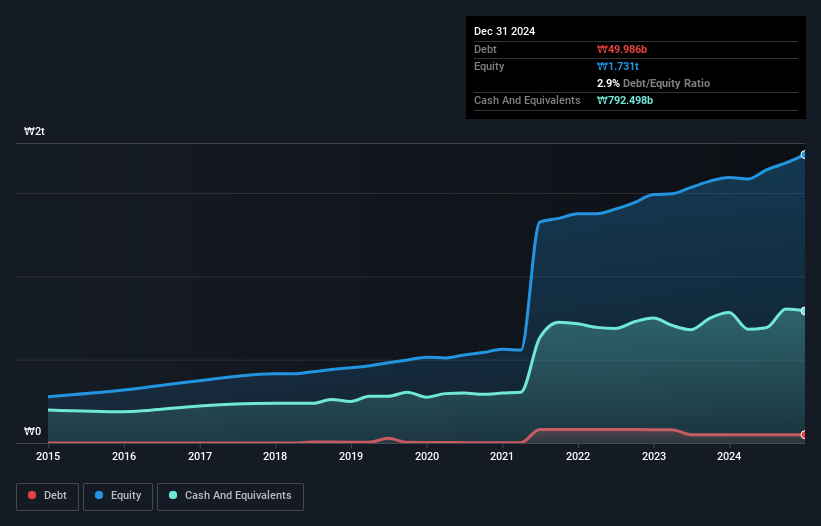
The external fund manager backed by Berkshire Hathaway's Charlie Munger, Li Lu, makes no bones about it when he says 'The biggest investment risk is not the volatility of prices, but whether you will suffer a permanent loss of capital.' When we think about how risky a company is, we always like to look at its use of debt, since debt overload can lead to ruin. We note that Hyundai Autoever Corporation (KRX:307950) does have debt on its balance sheet. But should shareholders be worried about its use of debt?
What Risk Does Debt Bring?
Generally speaking, debt only becomes a real problem when a company can't easily pay it off, either by raising capital or with its own cash flow. If things get really bad, the lenders can take control of the business. However, a more common (but still painful) scenario is that it has to raise new equity capital at a low price, thus permanently diluting shareholders. Of course, plenty of companies use debt to fund growth, without any negative consequences. The first thing to do when considering how much debt a business uses is to look at its cash and debt together.
What Is Hyundai Autoever's Debt?
As you can see below, Hyundai Autoever had ₩50.0b of debt, at December 2024, which is about the same as the year before. You can click the chart for greater detail. However, it does have ₩792.5b in cash offsetting this, leading to net cash of ₩742.5b.

How Healthy Is Hyundai Autoever's Balance Sheet?
Zooming in on the latest balance sheet data, we can see that Hyundai Autoever had liabilities of ₩1.24t due within 12 months and liabilities of ₩376.7b due beyond that. Offsetting these obligations, it had cash of ₩792.5b as well as receivables valued at ₩1.16t due within 12 months. So it actually has ₩331.0b more liquid assets than total liabilities.
This short term liquidity is a sign that Hyundai Autoever could probably pay off its debt with ease, as its balance sheet is far from stretched. Simply put, the fact that Hyundai Autoever has more cash than debt is arguably a good indication that it can manage its debt safely.
View our latest analysis for Hyundai Autoever
Also positive, Hyundai Autoever grew its EBIT by 24% in the last year, and that should make it easier to pay down debt, going forward. The balance sheet is clearly the area to focus on when you are analysing debt. But ultimately the future profitability of the business will decide if Hyundai Autoever can strengthen its balance sheet over time. So if you're focused on the future you can check out this free report showing analyst profit forecasts .
Finally, a business needs free cash flow to pay off debt; accounting profits just don't cut it. Hyundai Autoever may have net cash on the balance sheet, but it is still interesting to look at how well the business converts its earnings before interest and tax (EBIT) to free cash flow, because that will influence both its need for, and its capacity to manage debt. During the last three years, Hyundai Autoever produced sturdy free cash flow equating to 67% of its EBIT, about what we'd expect. This free cash flow puts the company in a good position to pay down debt, when appropriate.
Summing Up
While we empathize with investors who find debt concerning, you should keep in mind that Hyundai Autoever has net cash of ₩742.5b, as well as more liquid assets than liabilities. And it impressed us with its EBIT growth of 24% over the last year. So we don't think Hyundai Autoever's use of debt is risky. When analysing debt levels, the balance sheet is the obvious place to start. But ultimately, every company can contain risks that exist outside of the balance sheet. We've identified 1 warning sign with Hyundai Autoever , and understanding them should be part of your investment process.
At the end of the day, it's often better to focus on companies that are free from net debt. You can access our special list of such companies (all with a track record of profit growth). It's free.
Valuation is complex, but we're here to simplify it.
Discover if Hyundai Autoever might be undervalued or overvalued with our detailed analysis, featuring fair value estimates, potential risks, dividends, insider trades, and its financial condition.
Access Free AnalysisHave feedback on this article? Concerned about the content? Get in touch with us directly. Alternatively, email editorial-team (at) simplywallst.com.
This article by Simply Wall St is general in nature. We provide commentary based on historical data and analyst forecasts only using an unbiased methodology and our articles are not intended to be financial advice. It does not constitute a recommendation to buy or sell any stock, and does not take account of your objectives, or your financial situation. We aim to bring you long-term focused analysis driven by fundamental data. Note that our analysis may not factor in the latest price-sensitive company announcements or qualitative material. Simply Wall St has no position in any stocks mentioned.
About KOSE:A307950
Hyundai Autoever
Provides information and communication technology services in South Korea and internationally.
Excellent balance sheet and good value.
Market Insights
Community Narratives



